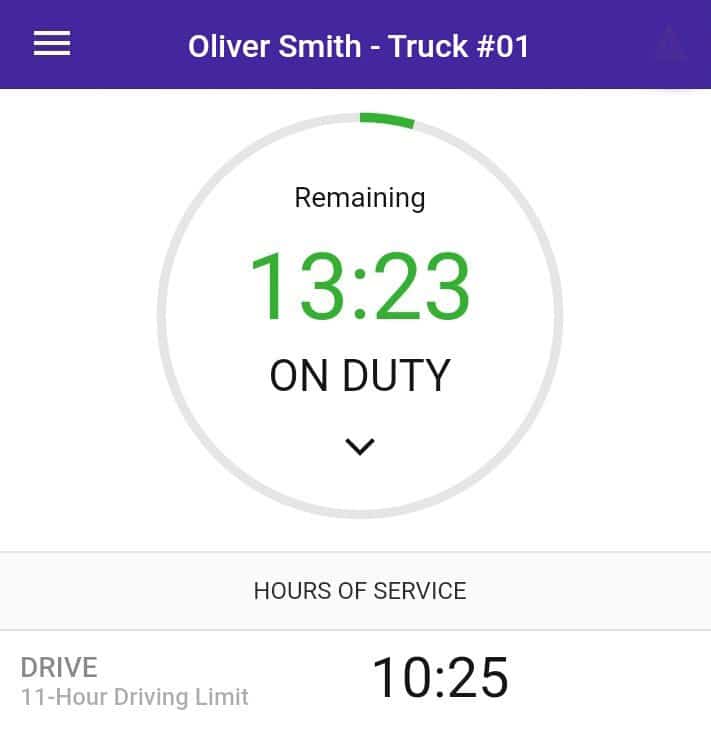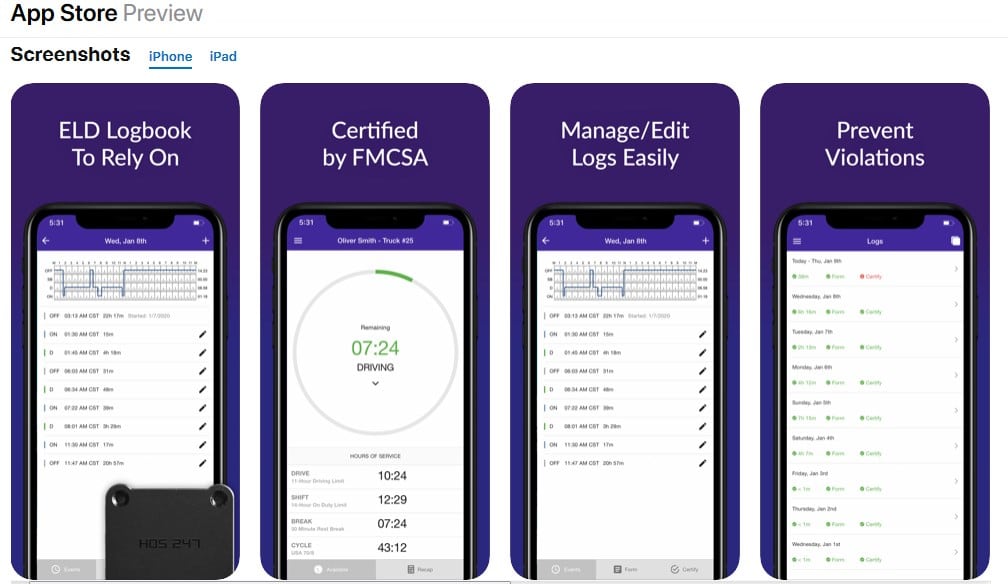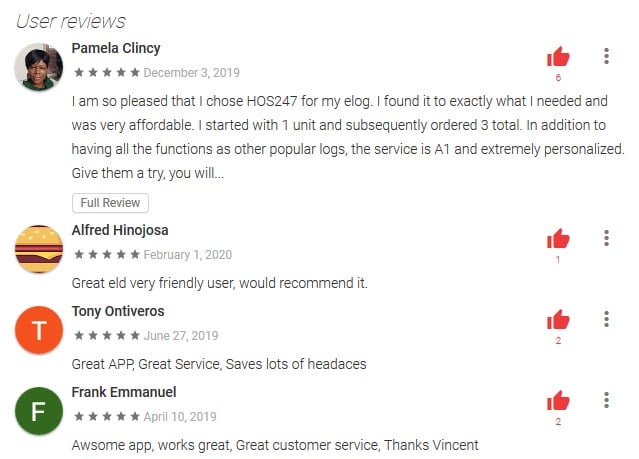Trucking companies need to find solid ELD solutions that help them stay compliant once the mandate is fully enforced. Making a poor choice of electronic logbook could be quite costly and time consuming for trucking businesses. Not only can it be frustrating for drivers and contribute to turnover rates, but it can also be an obstacle for operations and affect profitability. This is why trucking companies should be on board with finding the appropriate HOS app to stay compliant and make business more efficient.
Choosing an Industry Leader
Companies in the market for electronic logging software should be searching for the leaders who really stand out in the industry. HOS247 has been a longstanding leader offering both a convenient HOS app for drivers and reliable e-log hardware for the transportation businesses. Our company has been around for a while, providing services in both the United States and Canada.
We are committed to providing you with the highest level of customer service in the industry. Our team is multilingual, making it easier than ever to receive help in English, Spanish, Russian, or Polish. When you call in to ask questions, you won’t wait on hold for hours just to speak with someone who doesn’t know you or understand your business. You will always reach a familiar voice that can handle any question that arises.
Another advantage of going with HOS247 for your ELD app is that there are no contracts. Companies can try out our solution with no long-term commitment at stake. Our company is so confident that truckers and businesses will love our product that we offer hassle-free two week returns!
Are ELD Mandate Apps Transport Canada Compliant?
Many trucking companies are looking for the most cost-effective solution that will be Transport Canada compliant. They wonder whether the simple ELD mandate apps that are on the market will be sufficient for these purposes. In short, the answer is yes but they must be a part of an electronic logging device system.

A bring your own device (BYOD) approach to the ELD system is great because truckers can use their own mobile phones to conveniently track their hours or service or records of duty status. With this type of system, companies do not have to install an in-cab device to track the hours. A mobile phone does all of the required work and costs less to implement.
This is where some of the confusion comes in. According to the Transport Canada, an electronic logging device must be connected to the engine. A logbook app cannot do that on its own. Instead, the apps work in tandem with a BYOD approach because they connect with the system and display the information that the engine-connected device records.
To break it down further, the device connects to the engine and sends the information to the app where it can be monitored by the driver and supervisor. As long as there is a hardware piece that connects to the engine of the vehicle and cannot be altered, the e-log app that synchs with it can be Transport Canada compliant.
Android or iOS Apps?
There has been a longstanding debate about whether Android or iOS apps are preferable, particularly when it comes to these ELD apps. The truth is that it does not really matter which operating system is used, it is simply a matter of convenience and preference for the driver. HOS247 offers top-rated apps on both Android and iOS apps distribution platforms.
Consider the technology that the majority of your drivers already use. If they are connected via Apple products, it may be best to stick with the iOS operating system that they are familiar with instead of switching to Samsung or Google products that run on Android. There are no hard and fast rules about this topic, but any respectable ELD provider should offer both options for driver convenience.
Canadian ELD Mandate
The Canadian ELD mandate is the recent federal government regulation mandating the use of electronic logging devices in commercial vehicles to collect and log hours of service and record of duty status information.
First proposed on December 16, 2017 by the Canadian Government in their draft proposal published in the Canadian Gazette, the ELD mandate requires most commercial drivers operating extra-provincially to transition away from paper logs to a certified electronic logging device. Following an extensive public comment period, the final rule was published on June 13, 2019, where Transport Canada unveiled the compliance date for the mandate.
Transport Canada isn’t adopting a grandfather clause but did announce a one-year progressive enforcement period starting on June 21, 2021, when the mandate comes into effect and a subsequent six month delay was announced by the CCTMA. Carriers and drivers will not be penalized for no having a certified electronic logbook during this period of progressive enforcement, but all commercial drivers—unless exempt—must definitely have them past the final date of January 1, 2023.
What Is an ELD?
An electronic logging device is a specialized piece of hardware that is attached to the engine of a commercial vehicle in order to collect data and information whilst the engine of the truck is running. The statutory requirements for an electronic logbook to comply with the mandate are that the electronic logbooks only need to record how long an engine has been running and the time spent at rest. However, most ELDs come with extra tools and features to aid fleet managers and owner-operators become more efficient.
For example, some quality logbooks have GPS tracking capabilities so that fleet managers can track the progress of loads, whilst some use GPS to optimize deployment strategies, dishing out loads to drivers based on their real-time locations and available driving time.
Still, one of the most important benefits of an e-logger remains the accuracy of their hours of service records. Driver error or dishonest practices can distort the hours of service recorded in paper logs. Elogs ensure fleets and drivers are always compliant with the hours of service regulations—reducing the chance of HOS violation penalties and ensuring a “level playing field” for the whole trucking industry.

Who Must Comply with the ELD Mandate?
Drivers that operate federally, and are thus federally regulated, are required to comply with the ELD mandate. If a driver operates extra-provincially—crossing provincial borders—then they must use an e-log or risk fines and sanctions. It is irrelevant how much of their commercial driving occurs extra-provincially, if they cross province lines even once, they come under the jurisdiction of the federal government and are subject to the mandate.
If a driver is operating outside of province lines, an ELD must be used for all journeys, local or federal. For example, if a driver was to do an infrequent route from Toronto to Quebec City, they must use an electronic logbook not only on that extra-provincial route, but also on any local activities within Ontario. However, if the driver was always to operate within Quebec and did not in the course of their work leave that province, it would be up to the provincial government to decide what logging methods are mandated and thus this final rule on the use of ELDs would not apply.
Key Requirements of the ELD Mandate
Many trucking companies are still uncertain what the key requirements of the ELD mandate are. These electronic logging devices must be synchronized with the ECM of a commercial vehicle and must record information such as:
- Duty status
- Engine hours
- Vehicle miles
- Location
Along with the ELD rule, these devices provide a clear recourse for drivers who believe they have been harassed. They keeps neat and tidy records of their driving history so that they can defend themselves and their actions if necessary.
Why Switch to a Better HOS App?
When it comes down to it, it may be time for your trucking company to find a new service provider for your ELD app. Here are a few red flags that you should watch out for with your current provider.
Lack of Support
How long do you spend waiting on hold just to reach a customer service representative who can’t answer your question? Long hold times and unhelpful staff should be the first signs that a company is not a great fit for you.
Complicated Processes
A good ELD app should make the lives of your back-office staff and truckers significantly easier. With just a few clicks of the mouse or taps on the screen, staff members should be able to access all of the information they need. Office staff should be able to quickly pull reports and spend less time monitoring time logs than ever before. If they are finding the system to be cumbersome and complicated, it is definitely time to switch to a more effective system.
Similarly, drivers may complain about the experience of using the app. While it is normal to have a small learning curve in the beginning, be wary of persistent dissatisfaction. Unhappy drivers are not going to want to use the technology which can spell major problems for the company’s in the long-run. Make sure that they are satisfied with the software since they are the ones on the front lines using it daily.
Hidden Fees
Are you surprised by that whopping bill that came in last month? Not all companies are transparent with what they charge. They may tack on hidden fees for installation, training, or even device activation. If you are shocked by the bill, you may want to consider switching to a company with more straightforward pricing.
New Providers
Did your solution provider pop up after the Transport Canada ELD mandate was put into effect? Many tech companies came up with solutions after the fact but lack the necessary expertise to maintain their e-logs in the long run. Instead, you should search for a company with. proven track record. These long-standing companies have more experience building solutions with drivers in mind to help carriers improve profitability.
Choosing HOS247
If your trucking company is looking for the best HOS app on the market, you should consider signing up for a hassle-free two-week trial with HOS247. We don’t lock you into long-term contracts and we are top-rated by our users. Let one of our dedicated customer service reps help you boost your business and stay compliant with the ELD mandate.

I’ve co-founded, built and managed several transportation-related businesses. Now, I’m a founder and CEO of HOS247 – an AI Transportation Platform for trucking companies, freight brokers and other logistics operations. We are transitioning old-style operations to technology-advanced logistics entities and help them to grow their businesses. ELDs (electronic logging devices), fleet tracking and management 2.0 combined with AI-powered dispatch tools.












Fleet management is a comprehensive approach to managing and optimizing a company’s vehicle fleet, which may comprise trucks, delivery vans, or a combination of vehicles. Effective management is crucial to ensuring operational success and covers a wide array of tasks,

According to the ELD mandate, truck drivers in Canada will be required to use ELD log books to record hours of service by January 1, 2023. These devices collect data such as truck movements with GPS locations, miles driven, and

HOS247 HOS247 Rating HOS247 HOS247 Rating HOS247 is a top ELD provider in the trucking industry. We offer a heavy vehicle log book app for transportation professionals that takes care of compliance and optimizes fleet operations. Our customers

